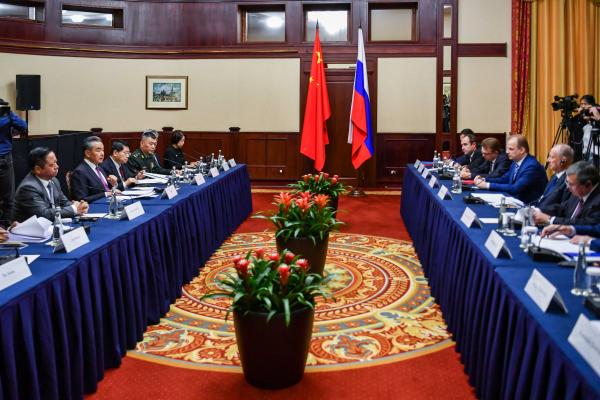
Wang Yi, a member of the Political Bureau of the Communist Party of China Central Committee and director of the Office of
the Central Commission for Foreign Affairs, and Nikolai Patrushev, Secretary of the Security Council of the Russian Federation, co-chaired the 18th round of China-Russia strategic security consultation in Moscow, capital of Russia, on Sept. 19, 2023. [Photo/Chinese Ministry of Foreign Affairs]
China and Russia will work closely on strategic security cooperation, defend true multilateralism, and promote the development of global governance system in a more fair and reasonable direction, Wang Yi, a member of the Political Bureau of the Communist Party of China Central Committee and director of the Office of the Central Commission for Foreign Affairs, said in Moscow on Tuesday.
Wang Yi and Nikolai Patrushev, Secretary of the Security Council of the Russian Federation, on Tuesday co-chaired the 18th round of China-Russia strategic security consultation. The two sides exchanged in-depth views on a wide range of issues related to deepening strategic cooperation between the two countries, strengthened coordination and enhanced mutual trust.
"China-Russia relations have withstood the test of the vicissitudes of the international situation and continued to develop healthily and steadily," said Wang. "The connotation of the strategic cooperation between the two countries has been continuously enriched, and the quality of pragmatic cooperation has been continuously improved."
Wang noted that as permanent members of the United Nations Security Council and responsible major countries, China and Russia work closely together on the international stage to jointly defend true multilateralism, oppose various practices of power bullying, and promote the development of the global governance system in a more fair and reasonable direction.
Wang stressed that the China-Russia strategic security consultation mechanism, as an important part of the comprehensive strategic partnership of coordination between the two countries in the new era, reflects the depth of political mutual trust and the breadth of strategic coordination between China and Russia.
"Since the establishment of the mechanism, the two sides have maintained close communication and positive interaction, effectively safeguarded common interests, and contributed wisdom to global strategic stability and the resolution of regional hot issues," Wang said. "The two sides firmly support each other on issues involving each other's core interests, demonstrating the due meaning of a comprehensive strategic partnership."
"We are willing to work with Russia to fundamentally follow the important consensus reached by the two heads of state, further release the effectiveness of the mechanism, and make greater contribution to safeguarding the national security of the two countries and promoting world peace and stability," he added.
Patrushev said that since the beginning of this year, under the strategic guidance of the two heads of state, Russia-China relations have developed steadily and practical cooperation has been advanced in an orderly manner.
"Both sides always respect and support each other. Faced with the challenges of rapid changes in the international security situation and frequent conflicts, Russia and China are not subject to external influence and interference, adhere to independence, and strengthen strategic coordination, demonstrating the unique value of comprehensive strategic partnership," said Patrushev.
Russia firmly supports China's legitimate stance on Taiwan and on issues related to Xinjiang, Tibet and Hong Kong, and opposes Western interference in China's internal affairs, Patrushev said, adding that Russia highly appreciates and supports the three major global initiatives proposed by President Xi Jinping and is willing to jointly promote stability and development in the Asia-Pacific region and the world.
The two sides agreed to hold China-Russia strategic stability consultation at an appropriate time and strengthen cooperation in law enforcement security, non-proliferation, and global governance of emerging technologies.
The two sides will also continue to strengthen collaboration under multilateral frameworks such as the Shanghai Cooperation Organization and the BRICS mechanism.




